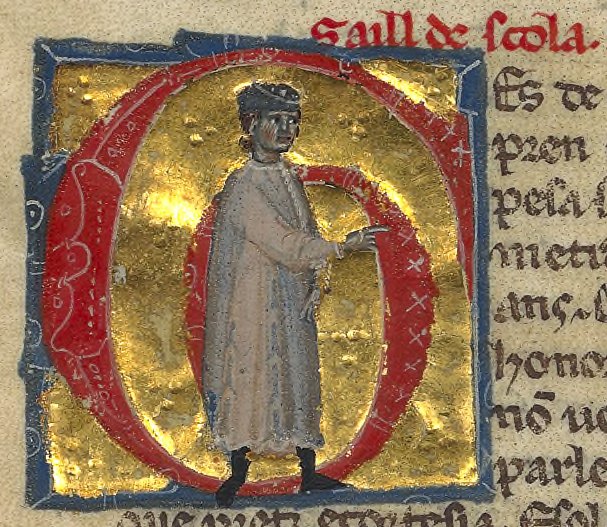Salh d'Escola on:
[Wikipedia]
[Google]
[Amazon]

 Salh d'Escola (; fl. 1195) was a
Salh d'Escola (; fl. 1195) was a

 Salh d'Escola (; fl. 1195) was a
Salh d'Escola (; fl. 1195) was a troubadour
A troubadour (, ; oc, trobador ) was a composer and performer of Old Occitan lyric poetry during the High Middle Ages (1100–1350). Since the word ''troubadour'' is etymologically masculine, a female troubadour is usually called a ''trobairit ...
from Bergerac in the Périgord
Périgord ( , ; ; oc, Peiregòrd / ) is a natural region and former province of France, which corresponds roughly to the current Dordogne department, now forming the northern part of the administrative region of Nouvelle-Aquitaine. It is div ...
, a former province of France
France (), officially the French Republic ( ), is a country primarily located in Western Europe. It also comprises of Overseas France, overseas regions and territories in the Americas and the Atlantic Ocean, Atlantic, Pacific Ocean, Pac ...
.Bergerac is spelled ''Barjarac'', ''Bragairac'', or ''Brageirac'' in Occitan. The meaning of his name, also spelled Sail or Saill, is uncertain; it may be an unusual given name. His surname, likewise, may be a family name, but there is no known location called "Escola" that could render it a toponymic
Toponymy, toponymics, or toponomastics is the study of '' toponyms'' (proper names of places, also known as place names and geographic names), including their origins, meanings, usage and types. Toponym is the general term for a proper name of ...
. The entire name may be a nickname meaning "defector from school" or "escapee from the cloister", indicating that he quit his education, either in a school or a monastery. On the other hand, it may signify a pedant
A pedant is a person who is excessively concerned with formalism, accuracy and precision, or one who makes an ostentatious and arrogant show of learning.
Etymology
The English language word ''pedant'' comes from the French ''pédant'' (used in ...
.
The details of Salh's life are provided in two main sources, one contemporaneous and one late. The first source is the poem "Pos Peire d'Alvernh′ a chantat" composed by the troubadour monk of Montaudon
The (Lo) Monge de Montaudon (meaning "monk of Montaudon") (fl. 1193–1210Gaunt and Kay, Appendix I, 287.), born Pèire de Vic, was a nobleman, monk, and troubadour from the Auvergne, born at the castle of Vic-sur-Cère near Aurillac, where he ...
in 1195. In it he good-naturedly criticises a gallery of troubadours, each in turn, usually humorously. One of those criticised is Salh d'Escola. According to the monk, Salh was a ''jongleur
A minstrel was an entertainer, initially in medieval Europe. It originally described any type of entertainer such as a musician, juggler, acrobat, singer or fool; later, from the sixteenth century, it came to mean a specialist entertainer who ...
'' who went to Bergerac and became a merchant
A merchant is a person who trades in commodities produced by other people, especially one who trades with foreign countries. Historically, a merchant is anyone who is involved in business or trade. Merchants have operated for as long as indust ...
. The later source is Salh's ''vida
Vida means “life” in Spanish and Portuguese. It may refer to:
Geography
* Vida (Gradačac), village in Bosnia and Herzegovina
* Lake Vida, Victoria Valley, Antarctica
* U.S. settled places:
** Vida, Montana
** Vida, Oregon
** Vida, Missour ...
'' (a short biography), which probably relied on "Pos Peire d'Alvernh′" to piece together its story. According to the anonymous biographer, Salh was the son of a merchant and became a ''jongleur''. He then went to Narbonne
Narbonne (, also , ; oc, Narbona ; la, Narbo ; Late Latin:) is a commune in France, commune in Southern France in the Occitania (administrative region), Occitanie Regions of France, region. It lies from Paris in the Aude Departments of Franc ...
and stayed for a long time at the court of "Ainermada de Narbona", the Viscountess Ermengard of Narbonne Ermengarde ( Occitan: Ermengarda, Ainermada, or Ainemarda) (b. 1127 or 1129 – d. Perpignan, 14 October 1197), was a viscountess of Narbonne from 1134 to 1192. She was the daughter of Aimery II of Narbonne and his first wife, also named Ermengarde ...
. Upon her death (1197), Salh entered the cloister at Bergerac and abandoned his "inventing ongsand singing".
Only one work by Salh, a ''canso
The Civil Air Navigation Services Organisation (CANSO) is a representative body of companies that provide air traffic control. It represents the interests of Air Navigation Service Providers (ANSPs). CANSO members are responsible for supporting ov ...
'' (love song), has been preserved: "Gran esfortz fai qui chanta ni.s deporta". It is an amorous confession to his lady for telling her to "die" in a moment of desperation or irritation.
Notes
Bibliography
*Egan, Margarita, ed. ''The Vidas of the Troubadours''. New York: Garland, 1984. . * Riquer, Martín de. ''Los trovadores: historia literaria y textos''. 3 vol. Barcelona: Planeta, 1975. {{DEFAULTSORT:Salh Descola 12th-century French troubadours French Christian monks Year of death unknown Year of birth unknown People from Bergerac, Dordogne